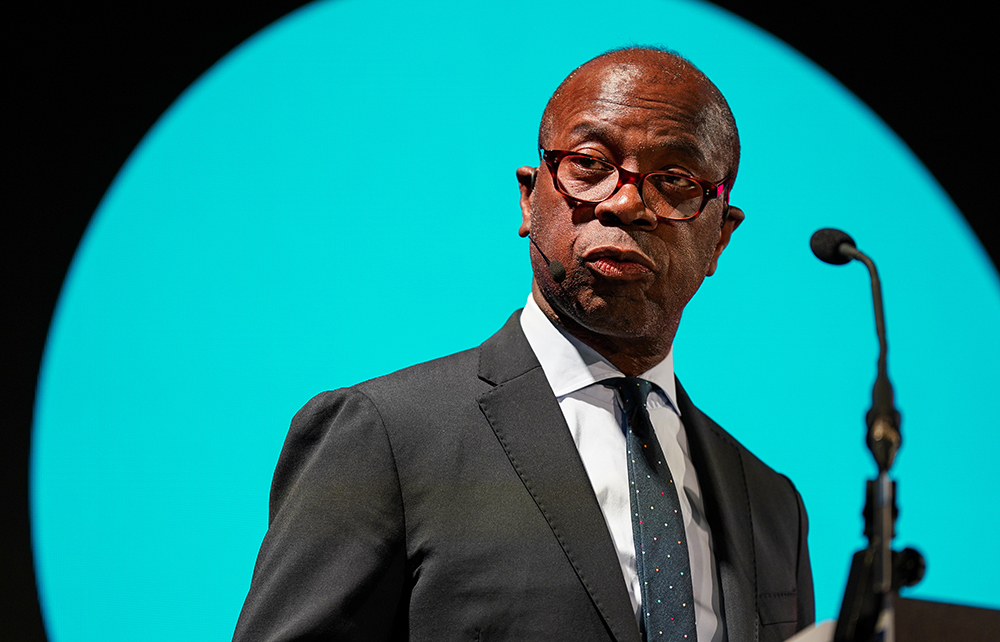How excited are you to hear the Prime Minister talking tech with Eric Schmidt, an American billionaire who used to run Google? Me neither. But their on-stage conversation is billed as the highlight of the government’s International Investment Summit in London next week, designed to show the world the UK is ‘open for business’.
What with Downing Street looking like Game of Thrones after the Red Wedding massacre, and both Angela Rayner’s Employment Rights Bill and Rachel Reeves’s tax-grab Budget looming, the timing of this summit could hardly be worse. A month ago there were rumours it was in disarray, with doubts whether it could attract a quorum of global investors or would have to be packed with unknowns from the much-mocked list of ‘120 business leaders’ who signed a letter of support for Labour before the election. Even now, only a handful of speakers besides Schmidt have been named.
As for the ex-Google boss himself, he’s billed as a guru on artificial intelligence and he’s here to help Starmer articulate a vision of the UK as ‘a hub for world-class talent’. But if he takes questions from the floor, I hope someone pipes up: ‘Are you still as proud as you once said you were of Google’s “capitalistic” tax avoidance strategies, which in your last year as CEO, 2011, meant paying just £6 million of corporation tax on £2.5 billion of UK sales?’
One way or another, Starmer-Schmidt is unlikely to win higher ratings than last year’s bizarre dialogue between Rishi Sunak and Elon Musk on the future of AI. And the whole summit, even with obsequious sponsorship from the likes of Barclays, HSBC and Octopus Energy, risks highlighting national weaknesses rather than strengths.
Too cynical? Britain breeds brilliant scientists and – as I so often observe for The Spectator’s Economic Innovator Awards – extraordinary entrepreneurs. For anyone who chooses to trade or invest here, this country offers undoubted rule of law, un-equalled grandeur of tradition and widely envied quality of life. Starmer is right to advertise all that. But our workforce lacks tech skills, our shrunken manufacturing sector is way behind in robotics, our lesser universities are as unfit for purpose as most of our utility companies, our capital markets are all but moribund, our transport infrastructure is dire, our EU borders impede access to our closest export market – and we’re ruled by a cabinet bereft of business experience that claims growth as a priority but in reality is hellbent on redistribution of wealth and rebooting of workers’ rights in ways that can only inject friction and dis-incentive into the productive economy.
That catalogue of woe would make a serious summit agenda. Current unease in the gilts market, pushing ten-year yields almost 2 per cent higher than equivalent borrowing cost for Germany, highlights international investors’ concerns – which won’t be assuaged by a load of tech-talk hot air.
Unipart hero
A salute to John Neill, unsung hero of alternative capitalism, who retires next month from his final advisory role at Unipart, the employee-owned supply chain business he has led since 1977 when he became, aged 29, managing director of the parts division of the nationalised British Leyland car group. A decade later, he steered a buyout of the business, renamed Unipart, from Rover, BL’s privatised successor. Owned 70 per cent by its workforce and pension fund and 30 per cent by long-term institutional investors, Unipart expanded beyond auto parts into rail and other sectors and thrived under Neill as chief executive, chairman, presiding spirit and largest individual shareholder.
Among other achievements, Neill championed the ‘Unipart Way’ – a philosophy of lean manufacturing through continuous innovation, adopted from Japan – and Unipart U, a training college for the company’s shopfloor workers and managers. Like the John Lewis Partnership, Unipart is an admirably different way of owning and growing a business that has rarely been copied, largely because visionaries like Neill and John Spedan Lewis are so rare.
Neill has recently written that the challenging of assumptions and constant search for improvement at the heart of Unipart’s success could do wonders for UK productivity on a wider front – and might even be applied to the NHS to make it ‘a global leader in healthcare innovation’. Health Secretary Wes Streeting, desperate for positive headlines, will surely be tempted to ask Neill to step out of retirement and do just that. But my advice to him – now he’s 77 – would be to swerve that high-stress assignment and rest on his considerable laurels.
Celebs for hire
I was beginning to think the bottom had fallen out of the corporate speaking market until I realised it has been cornered by Clive Myrie, the BBC newsreader, who has been gigging everywhere from the National Residential Landlords Association conference to the Coventry and Warwickshire chamber of commerce – but reportedly failing to declare at least £65,000 worth of this freelance work in the Beeb’s compulsory ‘external events register’. Myrie may have better dentistry and autocue skills than me but why, I ask plaintively, should celebs for hire like him hog the bookings while those of us who actually know stuff about business and sometimes do jokes as well are left waiting for crumbs from their table?
At best we get to play second fiddle. At one oil and gas banquet – before the well ran dry, as it were – I was paired with the Revd Richard Coles of Radio 4 and Strictly fame. He was a delightful dinner companion, but whereas I had to spend days mugging up on North Sea licence issues, carbon capture projects and the prospect of Ed Miliband’s return to office (much scarier in reality than my speech predicted, but that’s another story), all Coles had to do was talk about himself and pose for selfies. Maybe I should audition for Cast Away.








Comments